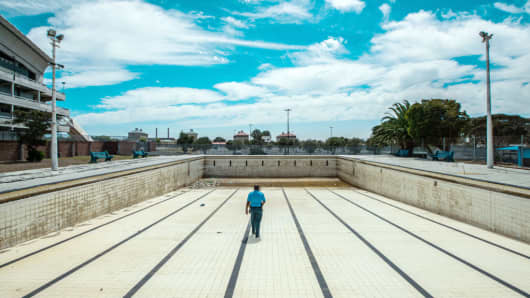Page added on April 12, 2018
Cities around the world should prepare for running out of water
It’s called “Day Zero”: when Cape Town, South Africa’s bustling port city, sees its water taps run dry, and its population thrust into a perilous situation.
Originally projected for this year, the impending crisis has been delayed in part by severe measures — the city instituted restrictions that amount to less than one sixth of an average American’s water consumption. Yet despite that effort, “Day Zero” is still projected to arrive next year.
And when it comes, the crisis will see the government switching off all the taps and rationing the resource through collection points.
That future isn’t just Cape Town’s. It’s a scenario cities around the globe may face, experts say.
It may be hard to fathom just how cities could be at risk of a water scarcity crisis when approximately 70 percent of the world is made up of the resource. The stark reality, however, is that the percentage of fresh water probably only amounts to about 2.5 percent, according to often-cited assessments.
Even then, a significant supply is locked up in ice and snow, which means just 1 percent of all fresh water is easily accessible to the global population.
Inequality in access to water is also quickly becoming a problem. While the affluent can find ways to get access to water— through deliveries or in-built tanks — poorer populations are left to their own devices.
That situation oftentimes leads to water theft — for profit, for survival, or for both.
A ‘wake-up call’
A nation’s development has frequently come at the cost of undercutting its sources of clean water, Betsy Otto, director of the World Resources Institute’s global water program told CNBC.
“For example, quite a bit of scientific evidence has shown that deforestation changed the hydrological cycle in the Amazon,” she said.
Although water scarcity is a very real and pervasive problem, experts said most cities are not immediately at risk of running out of water.
Still, it is extremely important that water scarcity is acknowledged as a global problem because cities should begin working on unique solutions to local problems now, according to Rebecca Keller, a senior science and technology analyst at intelligence firm Stratfor
“It won’t be the same exact scenario that Cape Town is facing,” Keller said. “It might be pollution, drought, drier climates or significant population growth.”
The troubles faced by Cape Town should serve as a “wake-up call” for other countries about the realities of increasing water stress, Otto said.
Water stress occurs when demand for the resource exceeds the available supply. It taxes the reserves and may lead to deterioration of fresh water resources.
In recent years, California faced a drought that lasted years, Australia survived the millennium drought, and Sao Paulo faced a water shortage crisis in 2015 due to both drought and inefficient infrastructures.
Otto summed up the global state of preparedness for water scarcity, saying: “We’ve either under-invested in measures or allowed existing structures to fall apart.”
Water theft
The United Nations’ 2010 recognition of water as a human right has complicated the issue of water theft, said Vanda Felbab-Brown, a senior fellow in the foreign policy program at think-tank the Brookings Institution.
“The right to water does not mean the right to free water,” Felbab-Brown explained, saying many people had misunderstood the UN. “In the same manner that people have to pay for food, they should expect to pay for safe water.”
That sentiment hasn’t stopped outright water theft on a large scale in countries like Brazil, India and Mexico. Companies and individuals illegally tap into pipelines and reservoirs, or they find other ways to avoid water meters.
There’s no single solution to the issue, however, as the context of water theft varies between places, Felbab-Brown said. But, she pointed out, better law enforcement, water monitoring, and creating comprehensive databases, are good starting points for governments.
“Governments need to recognize that they can’t just apply law enforcement without providing legal alternatives,” she added.
As of now, water smuggling mostly operates within countries’ borders, but it will eventually occur on an international scale, Felbab-Brown said.
That could become a point of geopolitical tension between countries dealing with transboundary water issues, Keller said.
For an example of international water tensions, take the construction of the Grand Renaissance Dam in the Nile, a $4 billion hydroelectric project financed by Ethiopia. It’s left Egypt fearing a potential disruption to its fresh water supply.
Controling demand
Mitigating water scarcity has proven to be a tricky political subject because, in many countries, environmental or climate solutions tend to have a hard time gathering enough political support to become a reality.
It is also extremely expensive to build out new water supplies, dams and desalination plants.
“Unless there is an acute event — a severe drought for example — it is the [political] constraints that play out in a long time frame,” Keller said.
Consequently, many governments have done little to guide their citizens on water-efficient behavior. That can be implemented through price controls, Otto said, but it’s rarely a popular measure.
“There should be two tiers of pricing. Conservation pricing, which charges the minimum amount for water that is sufficient for basic needs, should be provided at low rates. Discretionary water use, which is anything beyond the necessary amount, should be charged more,” Otto said.
On a national level, she said, governments should encourage conversation about conservation issues. That is, saving water will always be cheaper than building or drilling for new sources, Otto added.
The good news, experts said, is there will be time for governments to start preparing for a Day Zero scenario.
“It’s not going to be a surprise. The city is not going to run out of water suddenly,” Keller said.
9 Comments on "Cities around the world should prepare for running out of water"





twocats on Thu, 12th Apr 2018 6:41 am
EVs, Carbon Capture (HA! kidding, we’re never doing that), “Renewables” construction, Desalination – and all that will need to continue happening with increasing amounts of natural gas, renewable energy and diminishing CC.
A lot of reservations and demands being asked of natural gas future supplies.
MASTERMIND on Thu, 12th Apr 2018 8:23 am
We are going to be running out of oil, water, and natural gas in the next decade! Looks like we are going back into the caves soon. This is going to be the biggest catastrophe in the history of mankind…Nothing will ever come close…
MASTERMIND on Thu, 12th Apr 2018 8:24 am
prediction
Financial catastrophe resulting from resource depletion and a debasement of value of fiat currencies. Then a 3-month window of tyranny and government lockdown on citizens followed by a 3-month window of absolute carnage and death. Then, a period of about 6 months of slow die-off and that’s pretty much that. Oh, and starting sometime within the next 5 years or so. My prediction.
BobInget on Thu, 12th Apr 2018 10:58 am
Surly, few would object to water pipelines.
I’m sure most would welcome such transportation
crossing their land.
The problem seems to be too much persip in regions that already get plenty. Drought prone areas are getting more drought prone. If this trend continues, why not build fresh water pipelines?
Cloggie on Thu, 12th Apr 2018 11:13 pm
Wow, amazing! The German language imperial globalist media outlet der Spiegel supports Trump fears for China and his desire for trade balance. This is really new:
http://www.spiegel.de/wirtschaft/soziales/donald-trump-im-handelskrieg-seine-sorgen-wegen-china-sind-berechtigt-a-1202091.html
China is largely independent from Wallstreet. Alibaba would destroy Amazon without protection. China CAN economically defeat the West. A similar situation existed with Japan and its massive surplusses until 1985 when the Yen was forced to revalue. Something similar must happen in China, that should be forced to pay its citizens higher wages and as such become less competative. Trump is right according to der Spiegel and I agree.
Outcast_Searcher on Fri, 13th Apr 2018 12:45 am
Ah, Mastermindless. Who is the “we” that will be running out of oil, NG, AND water?
Do you have credible citations, or just fearmongering blogs?
Do you have math or just your doomer intuition?
Have you heard of the story of “The Boy Who Cried ‘Wolf'”? Because when you claim all doom all the time and are constantly wrong, who aside from the fast crash doomer echo-chamber, will believe you?
onlooker on Fri, 13th Apr 2018 8:36 am
A most propitious warning as our immense population continues to tax , deplete and degrade the resources of this planet. The GREAT FOLLY of our species is believing we can continue to sustain our enormous and growing population via ingenuity and technology. Our technology and ingenuity have limits like everything else in this Universe
Robert Zimmerman on Sat, 14th Apr 2018 10:05 am
So the same amount of water has been on our planet for ~4 billion years. A billion years from now, it will still all be here. If we “run out,” it is entirely a function of the vast shortcomings of our “take, make, waste” approach to its use. There is a way out, but it requires some different thinking: https://www.crwa.org/smart-sewering/report-summary?hsCtaTracking=9f8844a0-58cb-4f7b-82c6-c3bc48cb6d83%7C6d0eea26-b24c-4a34-9f28-a1be43069ba0
Kenz300 on Sat, 14th Apr 2018 12:21 pm
More people demand more resources.
Endless population growth will meet the limits of available resources.
Yet the worlds population continues to grow adding 80 million more people to the planet every year.
Unsustainable.